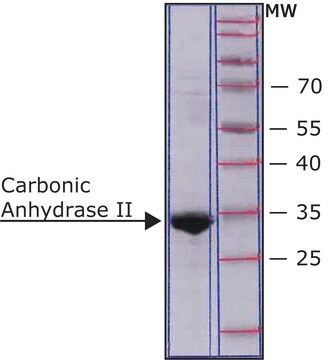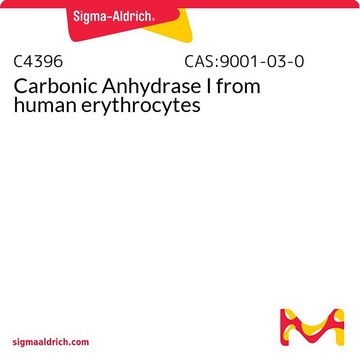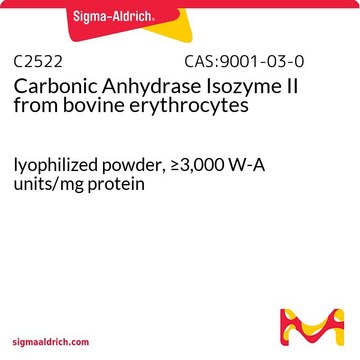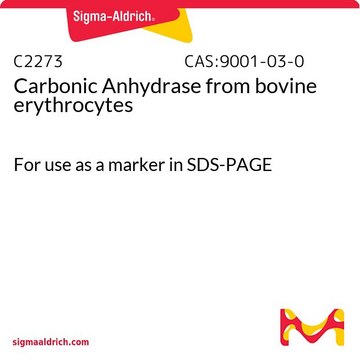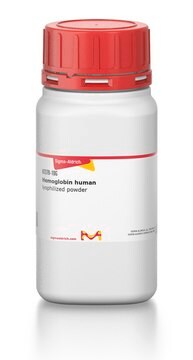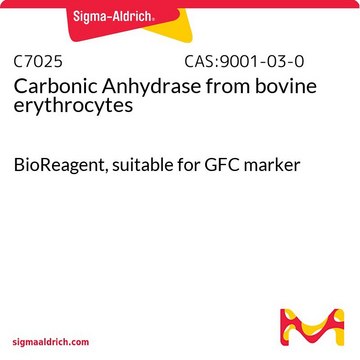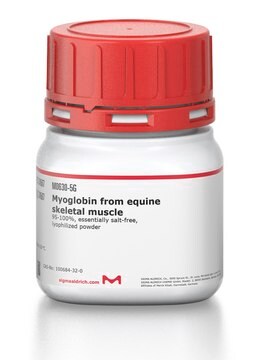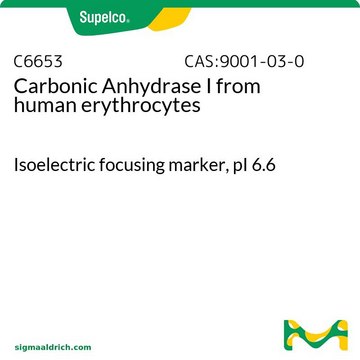C7749
Carbonic Anhydrase II bovine
≥90% (SDS-PAGE), recombinant, expressed in E. coli, ≥5,000 units/mg protein, buffered aqueous solution
Sinonimo/i:
Bovine carbonic anhydrase, Carbonic anhydrase enzyme
Autenticatiper visualizzare i prezzi riservati alla tua organizzazione & contrattuali
About This Item
Prodotti consigliati
Ricombinante
expressed in E. coli
Livello qualitativo
Saggio
≥90% (SDS-PAGE)
Forma fisica
buffered aqueous solution
Attività specifica
≥5,000 units/mg protein
PM
~29 kDa
Condizioni di spedizione
wet ice
Temperatura di conservazione
−20°C
Applicazioni
Carbonic Anhydrase II bovine has been used as a control in native gel electrophoresis and X-ray absorption spectroscopy characterization of Thalassiosira weissflogii carbonic anhydrase 1.
Carbonic anhydrase is used to create carbon dioxide capture systems and to research various purification techniques . Carbonic anhydrase is also used to study acid-base regulation in fish and carbonic anhydrase type II deficiency syndrome . Product C7749, Bovine carbonic anhydrase II (CA II), has been widely used as a model protein in the investigation of the protein folding process.
Azioni biochim/fisiol
Carbonic Anhydrase is a zinc-containing enzyme that catalyzes the reversible conversion of carbon dioxide to bicarbonate. One of its main physiological roles is to maintain the acid-base balance in blood and other tissues. Lack of carbonic anhydrase results in carbonic anhydrase type II deficiency syndrome, which is an autosomal recessive disease that causes osteopetrosis, renal tubular acidosis and brain calcifications . Carbonic anhydrases are metalloenzymes since most active sites contain zinc. Carbonic anhydrases are widely distributed in plant and animal tissues where they are involved in diverse physiological processes, such as photosynthesis, pH homeostasis, calcification, and bone resorption. The enzymes can be localized in the cytosol or mitochondria, be membrane bound with extracellular domains, or be secreted. Bovine carbonic anhydrase II (CA II) is a cytosolic, single-chain, approximately 29 kDa enzyme.
Definizione di unità
One unit will decrease th pH of a 20 mM tris buffer from pH 8.3 to 6.3 per minute at 0 °C.
Stato fisico
Supplied as a solution in 20 mM Tris, pH 7.6, with 150 mM NaCl.
Codice della classe di stoccaggio
10 - Combustible liquids
Classe di pericolosità dell'acqua (WGK)
WGK 1
Punto d’infiammabilità (°F)
Not applicable
Punto d’infiammabilità (°C)
Not applicable
Certificati d'analisi (COA)
Cerca il Certificati d'analisi (COA) digitando il numero di lotto/batch corrispondente. I numeri di lotto o di batch sono stampati sull'etichetta dei prodotti dopo la parola ‘Lotto’ o ‘Batch’.
Possiedi già questo prodotto?
I documenti relativi ai prodotti acquistati recentemente sono disponibili nell’Archivio dei documenti.
I clienti hanno visto anche
The active site structure of Thalassiosira weissflogii carbonic anhydrase 1
Cox EH, et al.
Biochemistry, 39(40), 12128-12130 (2000)
Joana da Costa Ores et al.
Chemosphere, 88(2), 255-259 (2012-04-20)
This work presents a study of industrially applicable techniques to obtain a biologically supported carbon dioxide capture system, based on the extraction of carbonic anhydrase from bovine blood. Carbonic anhydrase is a metalloenzyme which catalyzes the reversible hydration of carbon
K M Gilmour et al.
The Journal of experimental biology, 212(Pt 11), 1647-1661 (2009-05-19)
Carbonic anhydrase (CA) is the zinc metalloenzyme that catalyses the reversible reactions of CO(2) with water. CA plays a crucial role in systemic acid-base regulation in fish by providing acid-base equivalents for exchange with the environment. Unlike air-breathing vertebrates, which
Thomas M Bosley et al.
Brain : a journal of neurology, 134(Pt 12), 3502-3515 (2011-11-29)
Carbonic anhydrase type II deficiency syndrome is an uncommon autosomal recessive disease with cardinal features including osteopetrosis, renal tubular acidosis and brain calcifications. We describe the neurological, neuro-ophthalmological and neuroradiological features of 23 individuals (10 males, 13 females; ages at
Xiuhong Shan et al.
Journal of computer assisted tomography, 37(1), 22-28 (2013-01-17)
The objective of this study was to investigate the correlation between the degree of necrosis displayed in computed tomography (CT) image and the expression of hypoxic and angiogenesis biomarkers of breast cancer. Forty-four breast cancer cases were examined with CT
Il team dei nostri ricercatori vanta grande esperienza in tutte le aree della ricerca quali Life Science, scienza dei materiali, sintesi chimica, cromatografia, discipline analitiche, ecc..
Contatta l'Assistenza Tecnica.

